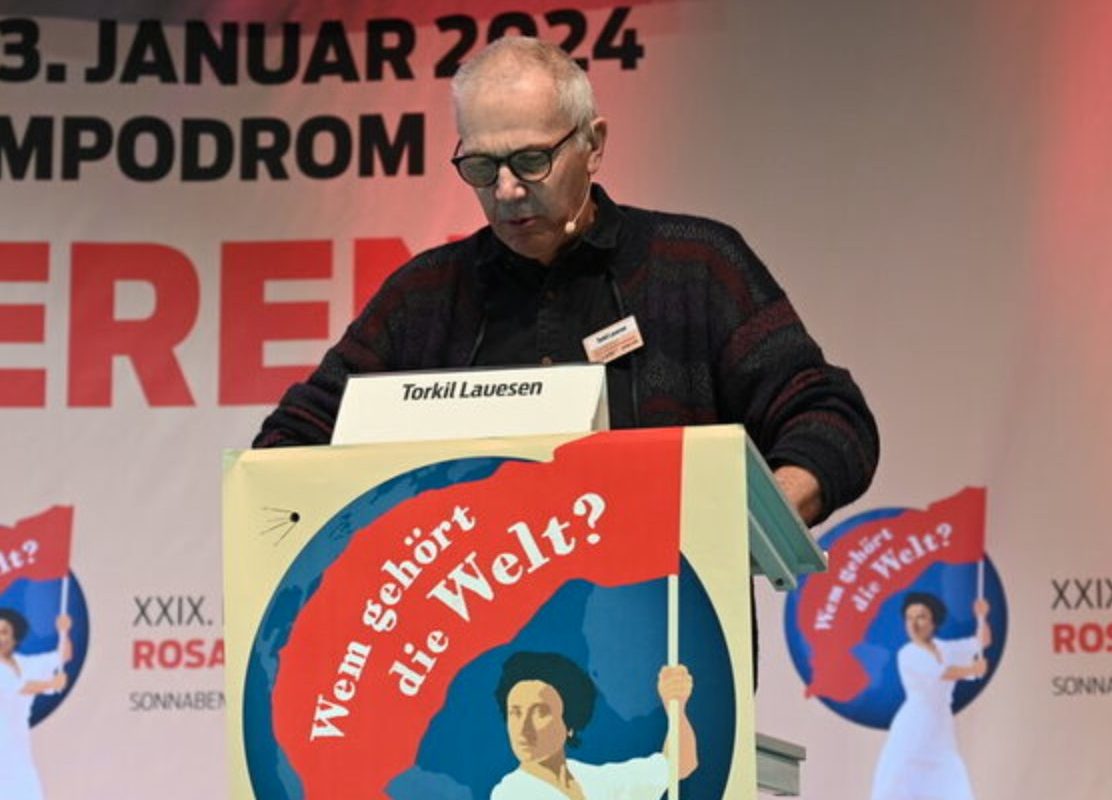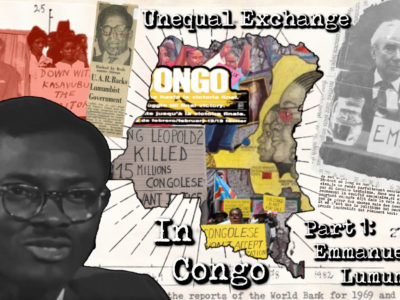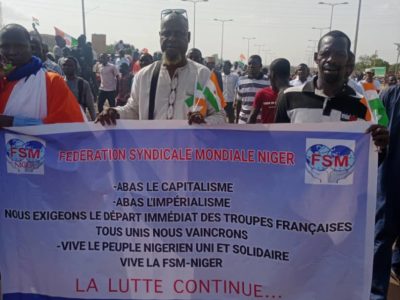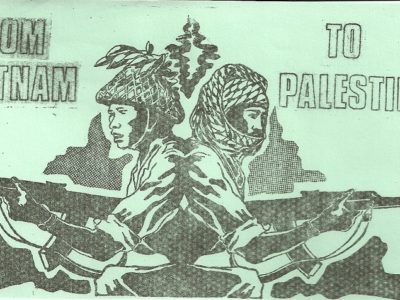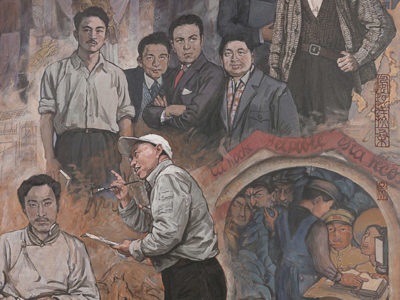The Rosa Luxemburg Conference, Berlin 13. January 2024
My cue-word from the organizer of the conference is: “How does sand get into the gears of the machine?” Let me stay in that metaphor. What is the machine then? It is capitalism, as one globalized accumulation process. However, there is already sand in the machine. And it might sound strange – but it is the United States, which is adding sand into the gears.
They are splitting and eroding the neoliberal world market, which has served them so well for forty years, providing huge profits and cheap commodities for consumers in the Global North. They are doing it by trade wars, sanctions and blockades, but why? Because the US no longer, can uphold its hegemony, by neoliberal economic means. It has weaponized economic competition, and turned to political pressure and military means, in a geopolitical struggle for dominance.
But why this decline in US economic superiority?
The neoliberal globalization changed the world system profoundly. On one hand, the industrialization of the Global South, increased the transfer of value to the North. But on the other hand, the development of the productive forces in the Global South, began to turn the table. China – became the crank in the global system of production, as an unintended effect of the capitalist desire to exploit the Chinese proletariat. In the encounter with neoliberalism, China kept the command of its economy, and managed to break two centuries of polarized development between rich and poor countries in the world system.
In fear of losing its hegemony, the US is strengthening old, and making new military alliances, seeking to translate its military power, into renewed economic dominance. This strategy results in unparalleled dangers for humanity, in terms of nuclear wars and a world-system, unable to tackle the mounting climate problems.
The US strategy is not an expression of strength, but of weakness. Capitalism has reached its limits in exploiting humans and nature. The system is in a structural crisis – economic, political, and ecological, it will not survive this century. It will collapse into chaos if we do not manage a transfer into a more sensible world order.
Our task
So, our task is not so much putting sand into the existing machinery – it is more comprehensive. It is to shut it down and install a new system. It is the establishment of a more equal and peaceful world-system. A system which produces and consumes in balance with nature. I do not mean some kind of ideal socialist world-system, here and now. Expectations of such an impossible project will just create frustration. The transformation must be based on the existing conditions in the world-system. The steps ahead must be realistic and responsible, not to be confused with reformism, as the aim of each step, is getting rid of capitalism.
This is a dangerous and difficult task, as the old machine risks breaking down into nuclear wars and climate collapse, and the new system is not a finished neat, eco-friendly model, with an inbuilt equalizer, ready to install. We will have to develop the new system along the transition process.
The end game of capitalism is on. The next decades will be dramatic, characterized by sudden swings, unlikely alliances, and violent events. Moreover, we are working under time pressure. The transition must take place within the next decades. And the longer it takes, the more the new system will be some kind of “lifeboat-socialism”, instead of a more prosperous system.
How do we approach this task?
We act, where we are situated. What else can we do? Our acts are often a response to local conditions, as we directly experience them. However, the local situations are not exclusively decided by local factors. We need to take a global perspective. We need a solid analysis of how the world-system works to develop a strategy, which can generate a praxis, which brings us towards our goal. We must not just flood down the steam, with a praxis, based on spontaneous feelings.
Since the dawn of European colonialism, the world system has been more and more globalized. The past fifty years of neoliberalism have globalized capitalist production itself. If we consider the development of the world system as a coherent process, then this process, according to dialectic materialism, has a principal contradiction, emerging from contradictions in the capitalist mode of production and reflected in world politics.
The principal contradiction
The principal contradiction affects regional, national, and local contradictions decisively. However, the interaction between the principal contradiction, and national and local contradictions is not one-sided. Due to the feedback effects, local contradictions affect the principal contradiction, as they push and change the relations between the aspects of the principal contradiction.
In studying a complex process like the world-system, we need to identify the principal contradiction, because this will tell us where to start, and is a guide for further analysis. The practical purpose of identifying the contradiction, is to affect its aspects, in such a way that the contradiction moves in the direction, which serves our interests.
Be specific
Hence, we need to be specific. Our analysis and strategy must tell us what to do tomorrow, next month, and in the coming years. We cannot act on general abstract concepts, such as “proletariat versus bourgeois” or “imperialism versus anti-imperialism”. We need to identify the specific movements, organizations, issues, events, and policies, which drive the process, and on which we can act. Furthermore, we cannot copy-paste strategies and praxis from other places or historical situations. We can learn from them, but we need to accommodate them to our specific place and time.
Our analysis must be able to pinpoint the process and the turning point of events, which will create a revolutionary situation, where we are located. On the organizational level, we must prepare ourselves and get the necessary skills, to be able to use the opportunity, when it arises.
The current principal contradiction
So, what is the current principal contradiction? Which practice can move its aspects in the right direction?
From the crises of neoliberal globalization, a principal contradiction emerges, between declining US hegemony versus the rise of a multipolar world-system headed by China. The United States operates its hegemony, from a secure continental home base, in alliance with a second imperial core of the European Union, Japan and Australia. It controls a global net of more than 800 military bases, and other global networks of finance, culture and information. The other aspect, headed by China, is an alliance of a conglomerate of states, united in the ambition to change the imperialist North-South structure, which has dominated the world-system for the past centuries. Therefore, the US versus China confrontation, is not only about the fate of the two countries but also about the future world order.
At present, US hegemony is under pressure from Russian resistance and Chinese economic competition. As a response, the US strives for a regime change in the two countries, to subject them to the interest of Western capital. The war in Ukraine is intended to do the job in Moscow. Beijing is to be pinned down through a network of military alliances, the expansion of NATO’s role in Asia, alongside trade wars, technological restrictions, and pushing to internal conflicts in China like Taiwan, Hong Kong, and Xinjiang.
China on its side, is developing alternatives to the US-dominated financial and monetary world-system. It expands South-South trade relations, and closer political cooperation with countries in the Global South, to create a multipolar world-system.
The current major confrontations: Ukraine and Palestine
So how does the principal contradiction manifest itself in the current major confrontations in the world-system? The US/NATO proxy war in Ukraine against Russia can also be seen as an attempt to encircle China. The expansion of NATO in East Europe and former Soviet republics aims at establishing a pro-Western, Yeltsin-type regime, in Russia, and then moving on towards China.
The Ukraine struggle for sovereignty, must be judged by the class character of the state, and its position in the ongoing geopolitical struggle. If integrated into NATO and the European Union, the Ukrainian state will be governed by neoliberal economics and right-wing politics. NATO will have bases in the heart of the former Soviet Union, for further advance. All political parties on the left in Ukraine are banned as pro-Russian. The popular support for the Zelensky regime is ambiguous. Approximately 6,3 million have fled the country since the war. Of them, 650.000 young men avoided military service. According to interviews, only 20 percent of Ukrainians in exile, intend to return home, when the war ends.
In the global context, the Ukraine war has strengthened US hegemony. It has disciplined the European Union back in the US-led NATO. The US will, in the near future, establish its own military bases in Norway, Denmark including Greenland, Sweden and Finland – as a springboard for further NATO advance towards the East and Arctic. Integrated into NATO, The EU is buying the full package, supporting the US globally.
All this does not mean that the Putin regime is progressive, but in the perspective of the principal contradiction, Putin’s resistance blocks the advance of the US hegemony. In the conflict between Russia and the West, one can hope that elements of the Russian elite might gravitate toward state capitalism with a social dimension, instead of the current conservative nationalism, if only for survival, severing the power structure of the oligarchy ruling present Russia.
The other major current confrontation zone is Palestine. Compared with the war in Ukraine, the relatively small Hamas attack, by fighters, armed with handguns, at a few settlements in occupied Palestine, for a couple of days, has set in motion an avalanche of events. An indication of how unstable the present world system is. Like Ukraine, the Palestinian struggle is for the establishment of state sovereignty, but the character is very different. It is not an inter-state war. It is a national popular liberation struggle against a colonial settler-state.
In a geopolitical context, Israel is a clone of the imperialist center, placed in the Middle East, as a “battleship on the ground”, serving the interest of US. The Hamas attack on Israel is weakening the US positions in the region, by uniting the Arab world and Iran against Israel. In a wider perspective, Western support for the Israeli genocidal response has discredited the West in the eyes of the Global South. Exposed the still present, colonial mindset of civilized barbarians.
This does not mean, that I support, the ideas of Hamas or the reactionary Islamic and Arab states. We have little in common, they do not like communists. But the Hamas attack has pushed the world in the direction of a more multi-polar world-system and mobilized a new generation of anti-imperialists.
That is why Biden, von der Leyen and the rest of the cast support the Zelensky regimes against Putin, and the Israeli settler state against the Palestinian people – it is not that complicated.
Anti-imperialism today
Let’s take a look, at the principal contradiction, from a wider and longer perspective. Anti-imperialism today cannot be the same, as it was in “the long 1960s”. History does not repeat itself; it moves ahead. The high revolutionary spirit, and the success of the anti-colonial struggle, from the late 1940s until the mid-70s, were due to a combination of contradictions in the world-system. The contradiction between the Socialist Block versus the US, and the contradiction between the emerging Third World on one side, and the US neocolonialism on the other side. This set of interlinked global contradictions, open up a wave of anti-imperialist liberation struggle, with a socialist perspective, across Asia, Africa, and Latin America.
All this changed with the counter-offensive of neoliberal globalization from the mid-1970s. It became difficult to continue national liberation into a socialist transformation. Capitalism was still a vital mode of production, dominating the world system. However, neoliberalism was not “the end of history”. The result of outsourcing of industrial production was on the one hand the transfer of value from South to North. However, on the other hand, the development of productive forces in the Global South began to break up the century-old polarization between the rich North and the poor South. In the 70s, the Third World demanded a “New World Order”, which came to nothing. Today the Global South are creating a new world order. Instead of the centuries of exploitative North-South relations, we see the emergence of mutually beneficial South-South investment, trade and political relations.
BRICS
The BRICS cooperation between Brazil, Russia, India, China and South Africa, was enlarged in September last year, now comprising 46 percent of the world’s population, and 36 per cent of the world economy, counterbalancing the G7 (U.S., Canada, the UK, France, Italy, Germany, and Japan.) with only 10 per cent of the world population; 30 per cent of the world economy. In the future BRICS will further outweigh the G7.
The different BRICS countries pursue strategies, to enhance their economic and political position in the world system. In that effort, they are at odds with the current rules of the global economy. To get financial resources, the Global South find that the IMF and World Bank, require that they open their economies, to the interests of the West’s transnational companies. Furthermore, is the trade of the Global South carried out in dollars, their reserves are held in dollars, and their debt is to be paid in dollars – they are subjected to a dollar hegemony. Instead, they want to take advantage of the complementarities in each other’s production and markets, build their own financial institutions, and trade in their own currencies, in order to break the unequal North–South ‘rules’ of the game.
This does not mean that BRICS is an anti-capitalist organization. But it is a step in the right direction. It is an organization developing an alternative international system of finance and trade to the North. BRICS members like Russia or Egypt are for sure repressive regimes. India is participating in the military alliance Quad, together with the US, Japan, and Australia, directed against China. Iran kills communists and is brutally suppressing women, Saudi Arabia and the United Arab Emirates are exploiting Southern migration labour, in the most extreme way – and so on. How can I judge this project to be progressive?
How to navigate in a multipolar world?
The emerging multipolar world system, consists of a complex of contradictory currents – between hegemonism and counter-hegemonism, conservative and progressive, capitalist and socialist forces. This is how the world looks. We have to keep in mind Marx’s words: ”No social order disappears, before all the productive forces, for which there is room in it have been developed, and new relations of production, never appear, before the material conditions of their existence, have matured in the womb of the old society.” We are reaching this point. Capitalism has become an obstacle for the development of human society. Then – as Marx continues, “comes the period of social revolution.” The period of social revolution needs to be understood from the global perspective, and identifying the principal contradiction in its interaction with local contradiction is vital. The challenge is to navigate, in this sea of interconnected contradictions, to move ahead towards socialism.
A rigid and idealist perception of national and international struggles obscures the complexity and changeability of current class behaviours and interests. With the quote of Marx in mind: there is no and has not been any “pure” socialism in the world – it is not possible. It is a project under construction, and the first step is to cut loose from the shackles of capitalism – US hegemony.
China is trying to establish an anti-hegemonic movement among states of the Global South. When the Chinese People’s Republic was declared in 1949, it adopted the strategy of “New Democracy.” According to Mao, the first step was moving against the international bourgeoisie, to clear the path for development, with the help of national Chinese capital, and by this way, “dealing a blow to imperialism,” to “clear a path for socialism.” One can see China’s current strategy as “New Democracy”, played out on the global level. Like the national bourgeoisie in China, Modi in India or the Saudi King Salman may be unreliable, and fall under the influence of the US, but they should be seen as possible allies helping to weaken the US hegemony, and develop the productive forces in the Global South, to prepare the ground for future socialist advance.
In the current phase, the decline of US hegemony is a condition for advancing a socialist transition. A defeat of NATO’s intention to include Ukraine in its sphere will contribute to this. The war in Gaza, and the US drive to maintain control over the Middle East through the Israeli settler state, have further undermined the credibility of Western values, in the eyes of the Global South.
Like in the sixties, these contradictions between the North, trying to uphold its hegemony, and the Global South, can create space for movements and nations struggling for socialism. The development of the productive forces in the Global South has placed them in a much better position to achieve this goal, than in the sixties.
The support for a multi-polar world system does not imply avoiding criticism of reactionary tendencies within the BRICS states. On the contrary, we should support the struggle against oppression and exploitation in any BRICS country, because broad popular support for a new socialist world order, is an essential condition for its success.
We must support the Chinese peasants and workers in their class struggle, to move towards socialism, which implies getting rid of remaining capitalist elements, national or transnational, such as Foxconn. 40 years of “opening up” to neoliberalism, have had an impact on the Chinese society, it takes time to change values and norms. But we also have to defend “socialism with Chinese characteristics” against US-led aggression. Just as the Soviet Union balancing imperialism, made decolonization possible, China balanced the US, strengthening the anti-imperialist struggle globally. To avoid the collapse of capitalism into a chaotic abyss, a strong China will be of decisive importance, for a transformation to socialism.
The US is still the dominant aspect in the principal contradiction, but the South is on the offensive, encircling the centre. While the transformative power of the Third World, in the sixties, was based on the “revolutionary spirit” – the attempted ideological dominance over economic development, the current transformative power of the Global South, is based its economic strength.
So, what is to be done here?
So, revolutionary change is necessary in our part of the world, since it is our “Imperial way of living,” which has originated the Earth’s ecological climate crisis, and because our states possess means of mass destruction, which could turn “the end game” into catastrophe. Still, the transformation process will commence in the Global South, where exploitation and oppression are most urgent, and environmental destruction is greatest, and hence the anti-systemic movements are strongest. We in the Global North, will not be the driving force in this preliminary phase. However, we should not be passive bystanders, waiting for the proletariat in the Global South to create a revolutionary situation, in our part of the World. We must make sure, that the North is no safe “hinterland” for imperialism, which means struggling against right-wing nationalism, racism, and most important, against imperialist military interventions.
We must support popular struggles in the Global South for equality in terms of class, race and gender, which means supporting explicit socialist movements. Not only in words, but in deeds, and by material means. To the extent possible, we should promote international workers’ struggle along the global production chains, in the climate and anti-war movements. The specific ways, and means to use, in the struggle, depend on the type of organization, and the specific political situation and place. It will range from mass movement to action groups, from parliamentary work, and civilian disobedience, to armed struggle.
Anti-imperialists – in the North – will a minority, but an important minority. We will be considered national traitors – but that is better than being a class traitor. In our political work, we sometimes feel, that we are unimportant and doing too little. However, there are no “small” struggles. There are separate sets of actions and interventions, that sometimes converge to force “big” changes. The capitalist system is out of balance. Small action can produce an avalanche of events. Like a butterfly´s flap with a wing can produce a storm.
The endgame will be dramatic and dangerous. We should keep in mind that revolution is not a “tea party”. Capitalism will not just lay down. If our struggle is more than words, it will have consequences. We should plan and be prepared for this, on the personal and the organizational level. We have a praxis today, and we know where we are heading. It is the medium term that we need to focus on. How will the global struggle develop in the next 2 to 5 years? What should our strategy be? How can I, and my organization, fit into the analysis of the objective and subjective forces of transition? What kind of support can we deliver?
The meaning of life
The current lack of confidence in socialism, is to a great extent, due to the disappointment with the experience of socialism in the Soviet Union, China, DDR, Cuba, Venezuela and you name it. However, it was – and is not socialism. It was efforts to build socialism, within the sea of hostile and dominant capitalism. The attempts to build socialism, in the past two centuries, must be seen, as part of a long transition process, rather than a row of failures. Attempts, which have contributed to the progress of the transition, by modifying capitalism as well as a learning process for building socialism.
The struggle of millions of communists and socialists, for the past two hundred years, among them Rosa Luxemburg and Karl Liebknecht, have not been in vain. They have contributed to the process. And to be part of this process —a tiny cogwheel in the machinery of transformation—and give it a little push in the right direction, seems to me to be “the meaning of life”. Not founded in some religion, or a belief in life after death, but founded in historical materialism, and the meaning of life before death — to hand over a world, more equal and in balance with nature to future generations. This is our urgent task in the coming years.

